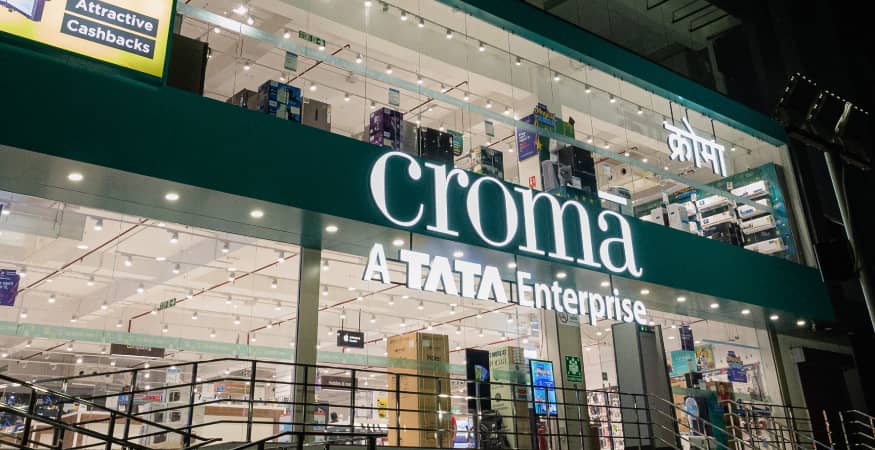
The Delhi High Court granted ex parte permanent injunction against the defendant entities which were misusing Tata’s “Croma” for fraudulent practices.
Facts
Infiniti Retail Limited, a wholly owned subsidiary of Tata Sons, is the registered owner of “Croma”. The retail chain “Croma”, which was launched in 2006, offers a wide range of retail products ranging from electronic products to kitchen appliances. The Trademarks Registry declared “Croma” to be a well-known mark on 24 February 2020. The plaintiff approached the Delhi High Court for injunction against the defendants 1 to 4 – the owners of domain names www.croma-share.com, www.croma-2.com, www.croma-1.com and www.croma-3.com respectively. These four defendants were into the practice of defrauding customers under the pretext of recruitment for part- time jobs.
Judgment
The High Court, vide order dated 5 December 2022, granted temporary injunction against “offering for sale, advertising or in any manner dealing in goods / products under plaintiffs registered marks viz. “CROMA”.
By judgment dated 19 January 2024, the Court granted permanent injunction against the defendants 1 to 4. The Court came to the conclusion that the defendant entities are using the plaintiff’s mark to create a misperception of association with the plaintiff and consequently, defraud the consumers (paragraph 11).
The Court ordered for:
- Permanent blockage of the impugned websites: and
- Suspension and disabling of the UPI IDs.
Comments
I have some policy-based comments here.
The Court ordered for blocking the websites and the UPI ids. But what is the remedy for customers who suffered legal injury? (This was not the issue before the Court. But this is pertinent.)
Those who suffered legal injury should be awarded damages. But who will bear the liability?
To my eyes, the liability falls on the domain registrars (such as GoDaddy and Google domains). It is a settled legal position that the trademark protection extends to domain names. If the domain registrar had carried out even a preliminary legal due diligence, it would not have awarded the domain names in the first place. This does not appear to be a case where the domain registrar can take shelter under safe-harbour provisions.
- SEO Powered Content & PR Distribution. Get Amplified Today.
- PlatoData.Network Vertical Generative Ai. Empower Yourself. Access Here.
- PlatoAiStream. Web3 Intelligence. Knowledge Amplified. Access Here.
- PlatoESG. Carbon, CleanTech, Energy, Environment, Solar, Waste Management. Access Here.
- PlatoHealth. Biotech and Clinical Trials Intelligence. Access Here.
- Source: https://spicyip.com/2024/01/cybersquatting-delhi-hc-on-infiniti-retail-limited-v-m-s-croma-share-ors.html
- :is
- :not
- :where
- 1
- 11
- 19
- 2006
- 2020
- 2022
- 2024
- 24
- a
- Advertising
- against
- and
- any
- appear
- appliances
- ARE
- AS
- Association
- awarded
- BE
- Bear
- before
- blocking
- but
- came
- CAN
- carried
- case
- chain
- COM
- comments
- conclusion
- Consequently
- Consumers
- Court
- create
- Customers
- cybersquatting
- dated
- dealing
- December
- declared
- defendants
- Delhi
- diligence
- does
- domain
- DOMAIN NAMES
- domains
- due
- Electronic
- entities
- Even
- extends
- Eyes
- Falls
- February
- February 2020
- First
- For
- four
- fraudulent
- from
- goods
- granted
- had
- Have
- here
- High
- http
- HTTPS
- ids
- if
- in
- into
- issue
- IT
- January
- Jobs
- jpg
- launched
- Legal
- liability
- Limited
- manner
- mark
- my
- names
- of
- Offers
- on
- or
- order
- out
- owned
- owner
- owners
- permanent
- Place
- plato
- Plato Data Intelligence
- PlatoData
- position
- practice
- practices
- preliminary
- Products
- protection
- range
- ranging
- recruitment
- registered
- registrar
- registry
- respectively
- retail
- sale
- Settled
- Share
- Shelter
- should
- some
- subsidiary
- such
- Take
- temporary
- that
- The
- the remedy
- These
- this
- time
- to
- trademark
- trademarks
- under
- UPI
- using
- was
- websites
- well-known
- were
- What
- What is
- which
- WHO
- wholly
- wide
- Wide range
- will
- with
- would
- zephyrnet












